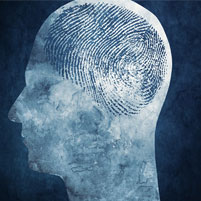Researchers Develop Way To "Fingerprint" the Brain
New Tool Uncovers How Brain's Structural Connections Are Individually Unique
By Shilo Rea
 Using a new imaging technique, researchers have developed a way to "fingerprint" the human brain, confirming what scientists have always thought to be true: the structural connections in the brain are unique to each individual person.
Using a new imaging technique, researchers have developed a way to "fingerprint" the human brain, confirming what scientists have always thought to be true: the structural connections in the brain are unique to each individual person.
The Carnegie Mellon University-led team used diffusion MRI to map the brain’s structural connections and found that each person’s connections are so unique that they could identify a person based on this brain "fingerprint" with nearly perfect accuracy. Published in PLOS Computational Biology, the results also show that the brain’s distinctiveness changes over time, which could help researchers determine how factors such as disease, the environment and different experiences impact the brain.
The new, non-invasive diffusion MRI approach captures the brain’s connections at a much closer level than ever before. For example, conventional approaches obtain a single estimate of the integrity of a single structural connection, or a white matter fiber. The new technique measures the integrity along each segment of the brain’s biological wires, making it much more sensitive to unique patterns.
"The most exciting part is that we can apply this new method to existing data and reveal new information that is already sitting there unexplored. The higher specificity allows us to reliably study how genetic and environmental factors shape the human brain over time, thereby opening a gate to understand how the human brain functions or dysfunctions," said Fang-Cheng (Frank) Yeh, the study’s first author and assistant professor of neurological surgery at the University of Pittsburgh. Yeh completed the research while at CMU as a postdoctoral fellow in psychology.
For the study, the researchers used diffusion MRI to measure the local connectome of 699 brains from five data sets. The local connectome is the point-by-point connections along all of the white matter pathways in the brain, as opposed to the connections between brain regions. To create a fingerprint, they took the data from the diffusion MRI and reconstructed it to calculate the distribution of water diffusion along the cerebral white matter’s fibers.

The measurements revealed the local connectome is highly unique to an individual and can be used as a personal marker for human identity. To test the uniqueness, the team ran more than 17,000 identification tests. With nearly 100 percent accuracy, they were able to tell whether two local connectomes, or brain “fingerprints,” came from the same person or not.
Additionally, they discovered that identical twins only share about 12 percent of structural connectivity patterns and the brain’s unique local connectome is sculpted over time, changing at an average rate of 13 percent every 100 days.
"This confirms something that we’ve always assumed in neuroscience — that connectivity patterns in your brain are unique to you," said CMU’s Timothy Verstynen, assistant professor of psychology. "This means that many of your life experiences are somehow reflected in the connectivity of your brain. Thus we can start to look at how shared experiences, for example poverty or people who have the same pathological disease, are reflected in your brain connections, opening the door for potential new medical biomarkers for certain health concerns."
In addition to Yeh and Verstynen, the research team included CMU’s Aarti Singh and Barnabas Poczos; the U.S. Army Research Laboratory’s Jean M. Vettel; the University of California, Santa Barbara’s Scott T. Grafton; the University of Pittsburgh’s Kirk I. Erickson; and Wen-Yih I. Tseng of the National Taiwan University.
The Army Research Laboratory funded this research.
Developing a way to fingerprint the brain is one of the many brain research breakthroughs to happen at Carnegie Mellon. CMU has created some of the first cognitive tutors, helped to develop the Jeopardy-winning Watson, founded a groundbreaking doctoral program in neural computation, and is the birthplace of artificial intelligence and cognitive psychology. Building on its strengths in biology, computer science, psychology, statistics and engineering, CMU launched BrainHub, an initiative that focuses on how the structure and activity of the brain give rise to complex behaviors.
The image above illustrates Local Connectome Fingerprinting. The local connectome is the point-by-point connections along all of the white matter pathways in the brain, as opposed to the connections between brain regions. To create a fingerprint, the research team took the data from the diffusion MRI and reconstructed it to calculate the distribution of water diffusion along the cerebral white matter's fibers.